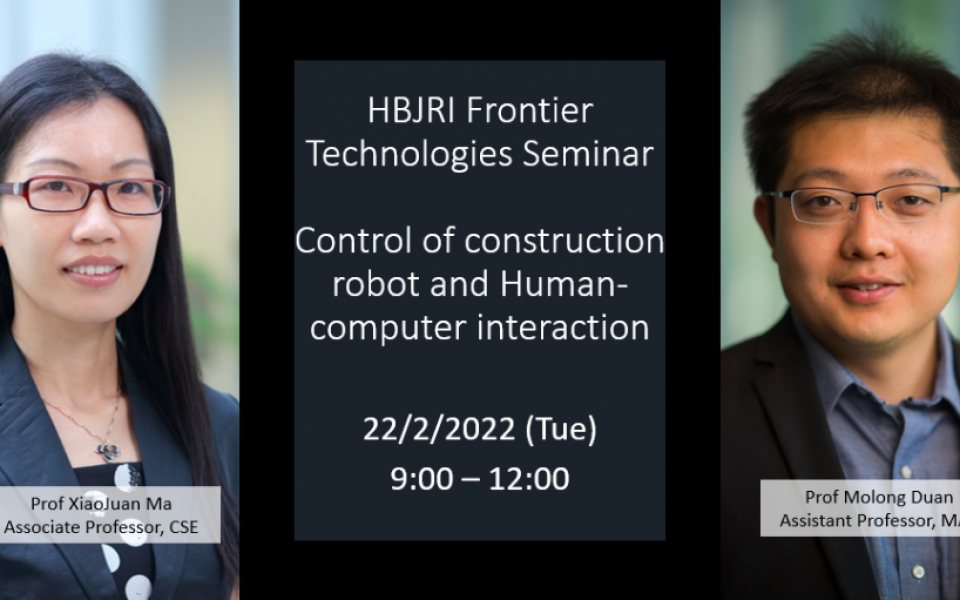Frontier Technologies Seminars 2022 by HKUST-BDR Joint Research Institute - Control of Construction Robot and Human-Computer Interaction
Supporting the below United Nations Sustainable Development Goals:支持以下聯合國可持續發展目標:支持以下联合国可持续发展目标:
HKUST-BDR Joint Research Institute (HBJRI) is going to organize an online Frontier Technologies Seminar on 22 Feb 2022 (Tuesday). Prof. Molong DUAN from the Department of Mechanical and Aerospace Engineering (MAE) and Prof. Xiaojuan MA from the Department of Computer Science and Engineering (CSE) will give seminars on topics on “Control of flexible construction robots with vibration compensation and over-actuation” and “Towards a Future of Human-Engaged AI: Social Manifestation of Human-Robot Interaction” respectively to researchers in Bright Dream Robotics (BDR) and HKUST.
All UST staff and students are welcome to attend the seminar and explore potential ways of collaboration on mutually-interested research projects.
Topics that BDR is interested in are as follows:
- Construction Robotics (typically, integration of control, actuation, and vision)
- AI & Big data
- Building Technologies & Intelligent Manufacturing
Please register here. If you would like to know more about the seminar or research collaboration with BDR, contact the institute at hbjri@ust.hk
Topics of the Seminar
• “Control of flexible construction robots with vibration compensation and over-actuation” by Prof. Molong DUAN
• “Towards a Future of Human-Engaged AI: Social Manifestation of Human-Robot Interaction” by Prof. Xiaojuan MA
Professor Duan obtained his Bachelor of Science degree in theoretical and applied mechanics at Peking University. He earned his Master of Science and Doctor of Philosophy degrees in mechanical engineering at the University of Michigan, Ann Arbor.
Professor Duan’s primary research focuses on modeling and control in manufacturing and aerospace applications for enhanced accuracy, productivity, efficiency, flexibility, intelligence, and safety. In manufacturing applications, he focuses both on physics-based and data-driven modeling of machine dynamics and the manufacturing processes, including machining, additive manufacturing, and incremental forming. Building on the models, his research exploits approaches such as smart controllers, input/output redundancy, advanced trajectory generation methods, and vibration compensation methods to enhance manufacturing performance. In aerospace applications, he focuses on the reduced-order modeling and control of very flexible aircraft and vertical takeoff and landing aircraft, with additional consideration of maneuver/gust load alleviation.
Xiaojuan Ma is an associate professor of Human-Computer Interaction (HCI) of the Department of Computer Science and Engineering (CSE), Hong Kong University of Science and Technology (HKUST). She received the PhD degree in Computer Science at Princeton University. She was a post-doctoral researcher at the Human-Computer Interaction Institute (HCII) of Carnegie Mellon University (CMU), and before that a research fellow in the National University of Singapore (NUS) in the Information Systems department. Before joining HKUST, she was a researcher of Human-Computer Interaction at Noah's Ark Lab, Huawei Tech. Investment Co., Ltd. in Hong Kong. Her background is in Human-Computer Interaction. She is particularly interested in data-driven human-engaged AI (HEAI) and Human-Engaged Computing (HEC) in domains including but not limited to education, health, and design.
